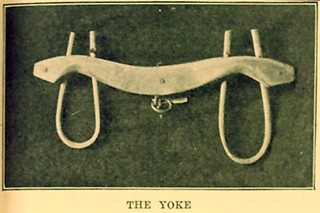
Volume 1
By
CLARENCE RAY AURNER

 |
IOWA STORIES Volume 1 By CLARENCE RAY AURNER |
 |
Transcribed by Sharon Elijah, submitted April, 2013
|
 pg 57 |
|
This train of forty persons with their oxen, their covered wagons, and their cows came across Indiana and Illinois to Bloomington now called Muscatine, on the Mississippi River. At this place was a rope ferry, already described on another page, by which everything was carried over the river. But it took nearly two days for all to cross and none went on until all were safely on the Iowa side of the stream. Not all of these emigrants were going to the same part of the country, and after a few days� more travel the family of the twelve-year-old girl, now the old lady of ninety, came to the Iowa River. Again they must cross over; but this time there was no rope ferry, -- only an Indian with his canoe, or �dug out�, made out of a log. This friendly Indian took the family over one at a time. The little girl, her sister, and her mother each went alone, kneeling in the bottom of the �dug out�, or log canoe, and keeping perfectly still. The big Indian rowed carefully and no accident happened, although the mother was very timid; -- she never felt very brave when Indians were about. The wagon was taken apart and carried over in pieces while the oxen and the cow had to swim. For all of his trouble the father of the family paid the Indian one dollar. But a dollar in those days was worth more than it is now. Even today the old lady remembers that the Indian was dressed as a warrior. He had a white blanket, bought, perhaps, from the trading house not far away, and in rowing the canoe, he threw the blanket off so his arms might be free. By the time the family had reached the place where the home was to be made, two months had passed since the start from Indiana. It was late in May when they were ready to plant the first crop, and unless the corn was planted or the seed was sown at once there would be no meal or flour for the next winter. On the place where this first crop was planted the old lady has lived for more than seventy-five years; from girlhood to ninety years of age, on the same Iowa farm. Her home is a real �homestead�, for one family has always kept it from the very first. There are not many homes of that kind left in our State. When the little girl came to the new home, the region about it was still the hunting ground of the Indians; they did not wish to give it up, for many kinds of game were found there. The warriors were the neighbors of the family and the great Chief Poweshiek was the friend of the young girl. His hundred braves, dressed in their war paint and on their painted ponies, raced past the white man�s home just to please the great chief who was proud of his followers. But this did not mean that they were going to war, nor that they were even unfriendly, for the peace pipe had already been smoked by Poweshiek and the father of the small household. Although the timid mother and the younger sister of this aged lady had no cause to fear these warlike braves, they were so unused to such a sight that it was quite terrifying. It seems that the old lady was a hungry little girl, and after living for a long, long time on corn cakes and wild honey she was very anxious to have a piece of real wheat bread. It happened one day that an Indian hunting party set out from the village not far away for a long trip to the northwest along the Iowa River. On the way they had to cross a creek near the log cabin of the little girl�s family. Fortunately for the hungry child, the small stream was full to its banks and the packs had to be removed from the backs of the ponies and be carried over on a log footbridge. The leader of the hunting party was a French half-breed name Cot�. He liked his white bread, and Jinny, his squaw wife it is supposed, had baked enough loaves to last during the hunting trip. If the bread got wet it would be spoiled and so it was left in the care of the settler�s family until the whole party could get across the smaller stream. Now came the chance of the child who was hungry for white bread. Although her father had forbidden her to touch anything which the Indians had left with him, she loosened the string which tied the bag and pulled out just one of the squaw�s wheat loaves. But just as she began to enjoy her feast behind the log cabin where no one could see, she was caught in the act by her timid sister, who feared the Indians and the half-breed far more than she dreaded hunger. Now what would her father say? Had he not forbidden this very thing? He must know at once! And what would Cot� say? He only said, �Why didn�t you take two?� |
Return to Iowa Stories Volume 1 Contents
Back to Muscatine Co. IAGenWeb, Index Page
Page created May 6, 2013 by Lynn McCleary